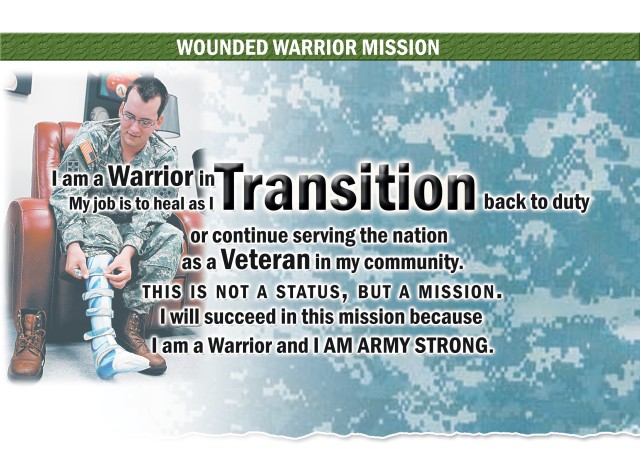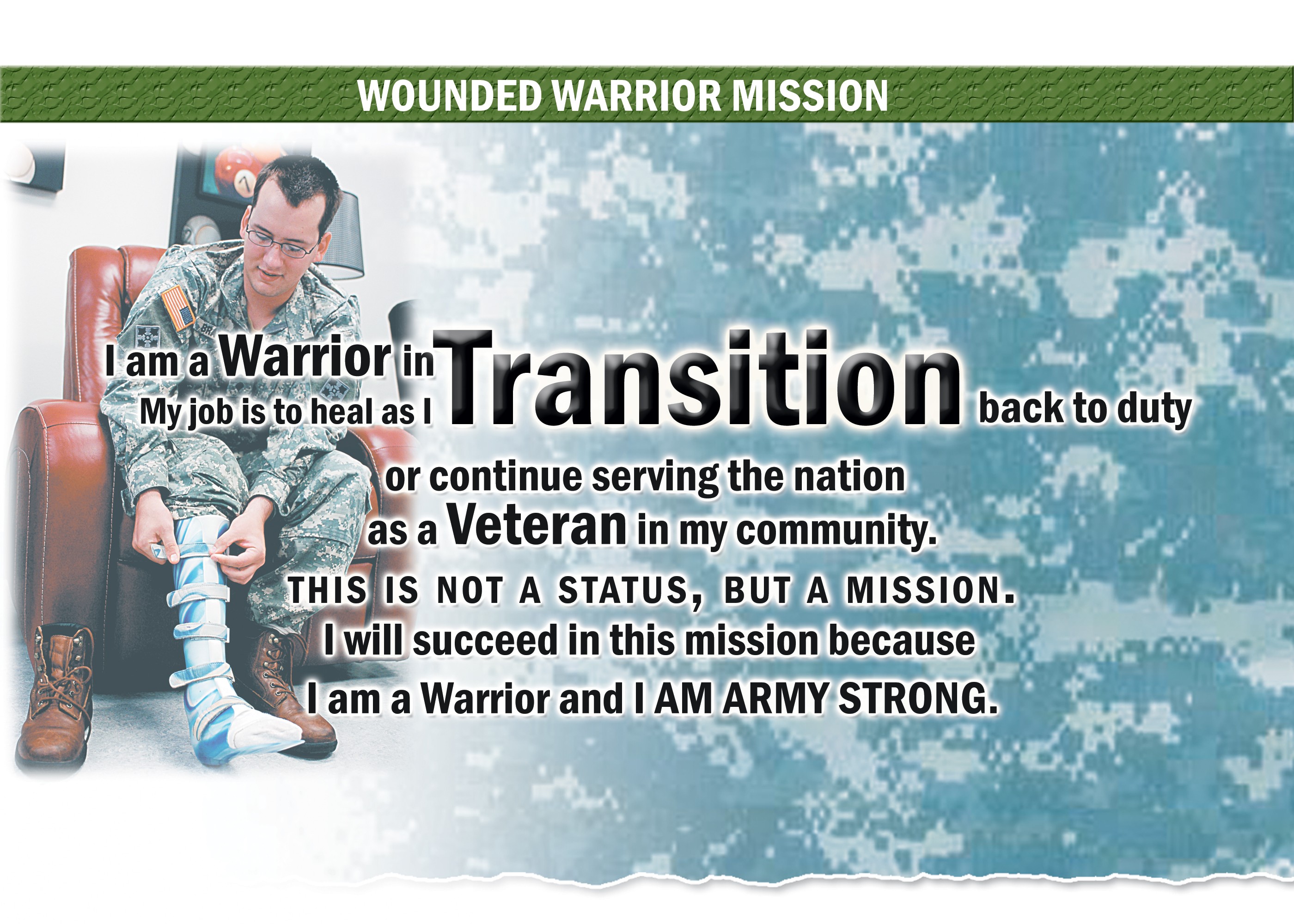FORT HOOD, Texas -- Specialist Anthony Brawdy and Sgt. 1st Class Karl Pasco are two combat-arms Soldiers serving their country.
Both Soldiers joined the Army, deployed to Iraq and were severely wounded while serving there.
Today, they remain in a tough battle to heal.
They are not alone in their struggles to recover and return to the fight.
Their battle buddies are their fellow wounded warriors, their unit cadre, medical caregivers and an installation support system.
As two of the more than 1,000 Soldiers at Fort Hood assigned to the Warrior Transition Unit, Brawdy's and Pasco's mission is to heal so they can either return to the fight or transition into civilian life.
Fort Hood's WTU is the largest of the Army's 36 Warrior Transition Units and the only element with two battalions.
Col. Dave Thompson, brigade commander, assumed command of Fort Hood's WTU in August.
He was tasked to provide command and control to the unit's two battalions and brigade headquarters.
With the backing and support of Carl R. Darnall Army Medical Center and III Corps and Fort Hood commander Lt. Gen. Rick Lynch, the WTU was transformed and reorganized to provide more focused care.
Soldiers in the 1st Battalion of the WTU at Fort Hood are those with long-term illness or injuries that require at least six months of continuous care.
The Soldiers assigned to Company A, 1st Battalion, WTU, are those who are receiving long-term treatment and care for injuries or illness as a result of combat.
"They are our wounded warriors," Thompson said.
In August, there were approximately 200 wounded warriors assigned to Co. A. Now, there are 145, Thompson said.
Brawdy and Pasco are two of those wounded warriors.
Brawdy
Brawdy,22, was a mortarman with 1st Battalion, 10th Cavalry Regiment, 2nd Brigade Combat Team, 4th Infantry Division in September 2006 when his up-armored humvee hit a roadside bomb during a route patrol near Baghdad.
This was the second time Brawdy was wounded during the deployment.
"The first time I got blown up I knew I got blown up," Brawdy said. "And I was mad."
The second explosion was the one that sent him home, and eventually to Fort Hood's WTU.
Brawdy, who was serving as the vehicle gunner at the time, fractured his spine and shattered both of his heels in the explosion.
After nearly 10 months at Walter Reed Army Medical Center, Brawdy came back to Fort Hood. But Brawdy is not ready to leave the Army.
"I'm a dedicated Soldier, that's what I do," he said. "I'm dedicated to my mission. I want to stay in."
"I might not be able to still do my (military occupational specialty), but I'm still able to be used in the Army," Brawdy said.
Brawdy isn't ready to give up his lifelong dream of being a Soldier.
"This was my goal since I was little," Brawdy said. "I wanted nothing but to be in the Army."
With the assistance and treatment he receives in the WTU, Brawdy's service does not have to end.
Pasco
Pasco was a cavalry scout with 1st Battalion, 8th Cavalry Regiment, 1st Cavalry Division in November 2007 when a roadside bomb packed with nine explosively formed penetrators hit his up-armored humvee during a patrol in Baghdad. One of the EFPs went through Pasco's arm, sheared off a large portion of his jaw before hitting and killing the driver.
After four months of treatment at Walter Reed, Pasco arrived at the Fort Hood WTU. For the second time.
On May 30, 2004, Pasco's humvee hit a 500-pound bomb and shattered his right leg. He spent nine months on convalescent leave with the Warrior Transition Unit before he was declared fit for duty and returned to his unit.
Pasco left for Iraq in October 2006. He returned to the WTU in March 2007.
He has spent 16 years in the Army and he is not finished. "I'm still a fully functioning Soldier," Paso said.
Pasco's road back is far from over. He said he has two more years of reconstructive surgeries to rebuild his jaw.
Pasco said he is "satisfied" with his care and the way the WTU is organized.
There is a camaraderie, the Co. A Soldiers agreed.
"When we talk, we, to an extent, understand what each other is going through," Pasco said.
In addition to the support they receive from care providers and fellow Soldiers in the unit, warriors in transition and wounded warriors have a cadre for support and leadership.
"I'm stubborn," Brawdy said. "My biggest problem is I have to remember to ask for help."
He said the cadre is very helpful with any issues he has had.
Cadre
Staff Sgt. Brian Streigle did not even know what the WTU was when he received orders to report as a squad leader.
"I didn't even know it existed," he said.
The combat engineer who was assigned to Special Troops Battalion, 3rd Brigade Combat Team, 1st Infantry Division, got to the unit Dec. 1, 2007, the day before 250 active-duty Soldiers reported to the unit for recovery.
Now he is a platoon leader for Co. A, 1st Bn., responsible for the care of combat wounded Soldiers. It is up to Streigle and his fellow cadre members to hold formations, ensure Soldiers make their appointments and are receiving the care and support they need and help out with other issues that might arise, all while reminding them they are still Soldiers and still expected to follow military protocol.
Streigle has helped Soldiers receive medals and awards to which they are entitled. He has helped them find housing.
"Sometimes, I sit back knowing I made this happen for this Soldier," he said. "It makes you feel good."
Streigle said his job is rewarding but can be frustrating at times too.
The Soldiers are recovering. They have medical appointments and other considerations.
"I still want them to act like they are in the military," he said. "You have to be able to pull yourself back and see where they're coming from."
They are still Soldiers though.
The unit has a 6:30 a.m. physical training formation for those who are authorized. There also are 9 a.m. and 4:30 p.m. formations Monday-Wednesday and Friday. Thursday's formation is at 2:30 p.m. because of the early release for Family time.
"Our motto is, Soldiers first, Soldiers always," Thompson said.
The commander encourages the WTU Soldiers to accept their issues, look at their goals and build the blocks to get there.
In three months, Thompson has reduced the overall number of Soldiers in the WTU from 1,400 to 1,097.
Thompson wants to reduce those numbers and get Soldiers where they need to be without lapses of time.
Focused care
The lag time between the WTU and either a transition to civilian life or return to the fight is being cut in large part because of the streamlining of the medical evaluation board process, the colonel said.
"We are moving in the right direction," Thompson said. "We're doing the right thing for our Soldiers and the right thing for the Army."
Thompson's approach to focused, comprehensive care extends to Families. They are an important part of the team, the commander said.
Instead of monthly Town Hall meetings with all of the WTU, Thompson has started monthly company-level Town Hall meetings for each company in the WTU in an effort to hear more voices and address more concerns.
Thompson and his team are working to reduce the number of missed appointments, develop comprehensive plan for each Soldier, address medical issues and provide overall support services.
With the comprehensive plan, Thompson wants his Soldiers to identify their short- and long-term goals and expectations and develop a plan to achieve those aspirations.
He has found educational institutions are willing to help Soldiers deal with their fears and injuries and illness.
"Our wheels are greased pretty well now," Thompson said.
Down the line
While still in treatment for his injuries, Brawdy is focused on healing and setting goals while spending time with his Family. He is awaiting his next surgery where his toes will be broken so he can bend them.
Pasco admitted he is not sure what he is going to do if he is able to stay in service, possibly train or teach Soldiers.
While going through treatment, Pasco doesn't expect or want special treatment.
"You're not a hero because you got wounded," he said. "You're an unfortunate SOB who got hurt."
Pasco just wants to recover and continue to be a Soldier.
"Life sucks now," he said. "You've got to get through it."
Thompson encourages Soldiers in the unit to use their time to pursue educational goals and participate in the work program.
"Some of them are scared," he said of the Soldiers. "This is the opportunity to do it. I want them to do something of worth."
While the future, whether in the military or in the civilian world, is uncertain for the Soldiers serving in the WTU, there are some guarantees.
Healing will be their primary mission to make them the best possible Soldiers or veterans. With support and care systems in place, these warriors are set up for success with the best tools available in order to accomplish their mission.


Social Sharing